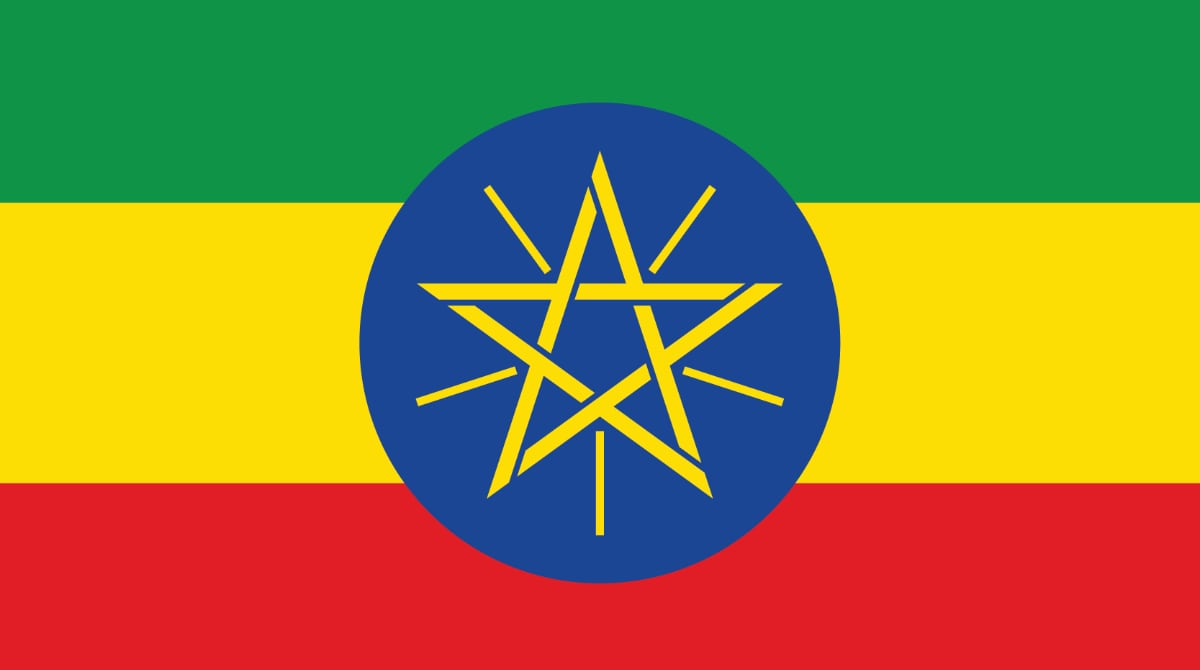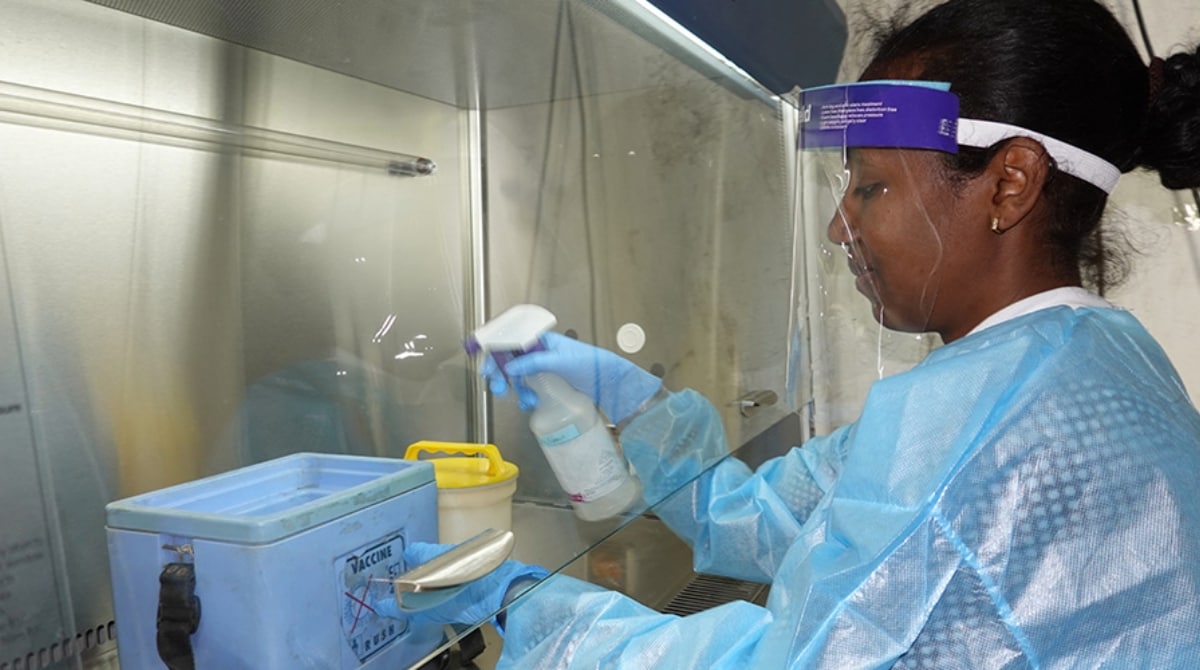At a glance
Since 2001, CDC and the Ethiopian Federal Ministry of Health (FMOH) have collaborated to build and strengthen the country’s core public health capabilities. Priority program areas address strengthening HIV and tuberculosis (TB) prevention, care and treatment efforts, global health security, laboratory diagnostic strengthening, workforce development, and overall health systems strengthening. CDC’s work aims to protect the health of Americans and public health around the world.

Key accomplishments
- Collaborated with the Ethiopian Public Health Institute (EPHI) to detect, monitor and respond to public health emergencies and threats, to quickly control outbreaks, and prevent further local and international transmission.
- Strengthened national and subnational laboratory capacity by aligning biosafety and biosecurity practices to improve timely detection of new disease threats that could cause an epidemic. Integrated quality assurance systems and specimen referral networks to improve recovery efforts in conflict-affected regions.
- Supported training for nearly 2,000 disease detectives who graduated from the Field Epidemiology Training Program (FETP).
- Established emergency operations centers (EOCs) in 12 of 13 regions to monitor and respond to high-priority disease threats. These have included monkeypox, viral hemorrhagic fevers, anthrax, COVID-19, meningitis, polio, cholera, measles, TB, HIV, severe acute malnutrition, dengue fever, chikungunya, scabies, drought-related public health issues, flooding, and internal displacement.
- By collaborating with the Africa CDC and other international partners, U.S. CDC strategically enhances health initiatives and addresses pressing public health challenges through effective public health policy and diplomatic efforts.
- Collaborated with the Government of Ethiopia to provide HIV treatment to over half a million people living with HIV in 2024 in alignment with the national strategy.
Global health security

CDC’s global health security initiatives in Ethiopia enhance the nation’s ability to prevent, detect, and respond to disease outbreaks, helping contain health threats before they spread across borders. As Africa’s second-most populous country and a regional hub, Ethiopia’s health infrastructure is crucial for protecting both regional and global populations, including Americans. These initiatives not only curb infectious disease spread but also promote global stability and economic prosperity.
Through strategic partnerships with Ethiopia’s Ministry of Health and regional institutions, the focus is on strengthening the country’s public health systems across the following core areas:
Laboratory strengthening
CDC enables Ethiopia’s decentralized laboratory system to enhance national and regional health security by improving timely detection of high-risk pathogens. This collaboration ensures compliance with international biosafety standards, upgrades quality management, and expands genetic sequencing and sample sharing capabilities.
Workforce development
CDC, in collaboration with FMOH, established the Ethiopia Field Epidemiology and Laboratory Training Program (EFELTP) in 2009. EFELTP trains and equips public health professionals, emergency responders, and surveillance officers in the country with the skills necessary to prevent, detect, and respond to public health emergencies at their source before they spread. EFELTP has trained nearly 2,000 residents. Currently, there are more than 100 residents enrolled in the program at the three levels—frontline, intermediate, and advanced.
Surveillance systems
CDC improves Ethiopia’s early warning and surveillance to detect outbreaks of international concern and provide real-time awareness. Partnering with emergency management teams, CDC supports integrated surveillance, streamlined data flows, and secure data governance, ensuring timely alerts and rapid response activation of core response functions.
Public health emergency management
CDC capacitates Ethiopia’s emergency management by supporting 12 regional and 11 sub-regional Emergency Operations Centers (EOCs) for rapid outbreak mobilization within 72 hours. This support includes but not limited to upgrading facilities, streamlining incident information management, and training response teams. These capabilities enhance preparedness, investigation, and response, improving command, control, and communication to contain threats at their source and protect cross border travel.
HIV and TB
As a key implementer of the U.S. President's Emergency Plan for AIDS Relief (PEPFAR), CDC plays an essential role in the fight against HIV and TB. With unmatched scientific and technical knowledge and long-standing relationships with ministries of health, CDC is uniquely positioned to advance HIV, TB, and other global health security activities that keep Americans safe at home and abroad.
Through PEPFAR, CDC provides critical support to Ethiopia's public health infrastructure, improving the country's ability to prevent, detect, and respond to HIV, TB, and other infectious diseases and minimizing their risk from entering the U.S.
Immunization
CDC’s immunization experts partner with Ethiopia to:
- Support outbreak detection and investigation, as well as immunization campaign activities for measles, polio, cholera, and other vaccine preventable diseases (VPD).
- Eradicate polio and eliminate measles Develop an evidence base for ways to better deliver vaccines and provide technical support to the FMOH on improving immunization systems and improving vaccine coverage to prevent VPD outbreaks.
- Strengthen the national and subnational routine immunization program.
- Provide technical support to introduce new vaccine.
Malaria
With federal support, the EFELTP launched a malaria training program in 2020 to build expertise in surveillance and outbreak response. Over 20 residents have contributed to malaria control through fieldwork, including developing reports, evaluating systems, and conducting research, enhancing the capacity of decision-makers to respond effectively to malaria trends and outbreaks.
Success story spotlight
Early action stopped Marburg in Ethiopia
When Ethiopia confirmed its first-ever outbreak of Marburg virus disease in November 2025, the response clock started immediately. Marburg is a rare but severe hemorrhagic fever with a high fatality rate and no licensed vaccine or treatment. Without rapid action, outbreaks can escalate quickly, threatening lives and increasing the risk of international spread.
From day one, CDC activated its emergency response and deployed experts to support Ethiopia's Ministry of Health and the Ethiopian Public Health Institute. Working closely with national and international partners, CDC helped strengthen surveillance, laboratory testing, infection prevention and control, and border health measures to contain the outbreak early.
CDC epidemiologists supported case detection and contact tracing, while laboratory experts expanded testing capacity and improved biosafety practices. Infection prevention teams trained health care workers nationwide to reduce transmission risk in clinical settings. Border health specialists strengthened screening at key points of entry, including Bole International Airport, to limit the risk of spread beyond affected areas.
The outbreak was contained entirely within Ethiopia. A total of 14 laboratory-confirmed cases and nine deaths were reported, with no cases identified outside the country. On Jan. 26, 2026, Ethiopia's Ministry of Health declared the outbreak over.
By acting quickly and working side by side with Ethiopian partners, CDC helped stop Marburg at its source, protecting communities in Ethiopia while reducing risks to global health and U.S. public safety.

![[thumbnail] (hidden)](/global-health/media/images/2025/11/Ethiopia_thumbnail.jpg)